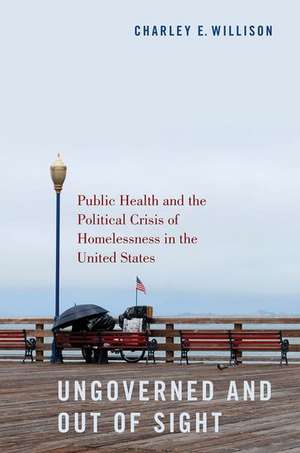Ungoverned and Out of Sight: Public Health and the Political Crisis of Homelessness in the United States
Autor Charley E. Willisonen Limba Engleză Paperback – 6 oct 2021
Preț: 267.18 lei
Preț vechi: 333.52 lei
-20% Nou
Puncte Express: 401
Preț estimativ în valută:
51.12€ • 53.52$ • 42.30£
51.12€ • 53.52$ • 42.30£
Carte disponibilă
Livrare economică 05-11 martie
Preluare comenzi: 021 569.72.76
Specificații
ISBN-13: 9780197548325
ISBN-10: 0197548326
Pagini: 256
Dimensiuni: 152 x 231 x 18 mm
Greutate: 0.64 kg
Editura: Oxford University Press
Colecția OUP USA
Locul publicării:New York, United States
ISBN-10: 0197548326
Pagini: 256
Dimensiuni: 152 x 231 x 18 mm
Greutate: 0.64 kg
Editura: Oxford University Press
Colecția OUP USA
Locul publicării:New York, United States
Recenzii
Ungoverned and Out of Sight provides a fresh perspective on the complex governing arrangements for American housing policy and the implications for public health. A must read for public policy and public health scholars.
Charley Willison has written an urgently important book that explores and explains critical facets of the politics of homelessness policy. Marshalling an impressive range of qualitative and quantitative data, Ungoverned and Out of Sight highlights homelessness as a vital public health problem while advancing our understanding of how local policy processes shape homelessness governance. With remarkable clarity, devastating depth, and compelling breadth, Willison offers knowledge that is crucial for addressing homelessness as a structural political problem. This book is a must read for political scientists, public health scholars, policy makers, and everyone who is part of the decentralized complex of actors who play a role in the systems that structure homelessness.
Homelessness is viscerally experienced at the local level. Local governments play a crucial role in shaping factors that affect homelessness, like housing development and police behavior, yet direct responses to homelessness exist largely outside of local government. Why would this be? Using novel quantitative data along with in-depth qualitative evidence from three divergent cases, Charley Willison identifies four influential actors in homelessness response and explains how this history of devolution, combined with a lack of coordination among powerful players, contributed to homelessness policy responses coming up short.
Charley Willison has written an urgently important book that explores and explains critical facets of the politics of homelessness policy. Marshalling an impressive range of qualitative and quantitative data, Ungoverned and Out of Sight highlights homelessness as a vital public health problem while advancing our understanding of how local policy processes shape homelessness governance. With remarkable clarity, devastating depth, and compelling breadth, Willison offers knowledge that is crucial for addressing homelessness as a structural political problem. This book is a must read for political scientists, public health scholars, policy makers, and everyone who is part of the decentralized complex of actors who play a role in the systems that structure homelessness.
Homelessness is viscerally experienced at the local level. Local governments play a crucial role in shaping factors that affect homelessness, like housing development and police behavior, yet direct responses to homelessness exist largely outside of local government. Why would this be? Using novel quantitative data along with in-depth qualitative evidence from three divergent cases, Charley Willison identifies four influential actors in homelessness response and explains how this history of devolution, combined with a lack of coordination among powerful players, contributed to homelessness policy responses coming up short.
Notă biografică
Charley Willison, PhD, MPH, MA, is a National Institutes of Mental Health Postdoctoral Fellow at the Harvard University Department of Health Care Policy. Her work focuses on health policies that are designed and/or delivered at the local level, including homelessness, housing, behavioral health policies and disaster responses.
